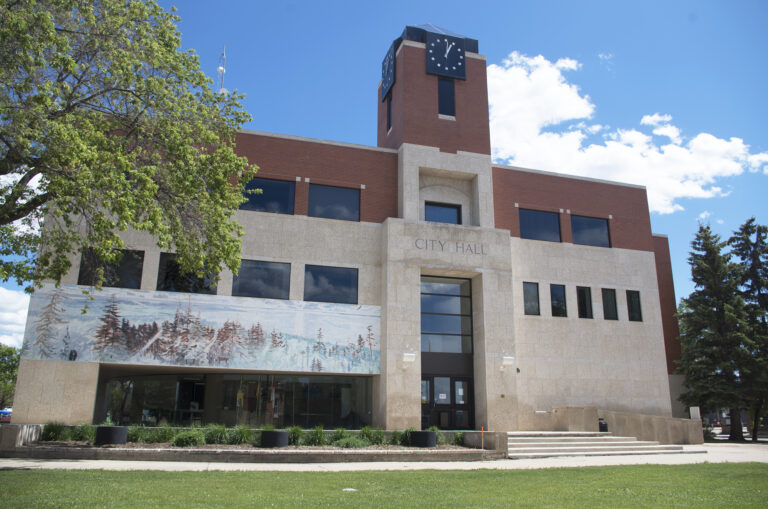
An updated version of the City of Prince Albert’s bike bylaw passed first reading on June 21 without a section making bike helmets mandatory.
Council instructed city administrators to begin looking into the issue at an October 2019 council meeting. However, city manager Jim Toye recommended council reject such a bylaw because it would reduce the number of cyclists on city streets, increase police interactions with vulnerable populations, and increase financial costs for popular bike sharing systems.
Toye based his decision on a National Transportation Safety Board (NTSB) report from 2020, which showed that requiring all riders to wear helmets had proven negative effects. Instead, he suggested council work with administration on a public safety campaign on safe cycling., or consider passing a bylaw requiring vehicles to give cyclists at least one meter of space when passing them.
Toye encouraged all riders to wear helmets, and said he himself wears one when he rides a bike, but said a mandatory law was unlikely to be effective unless it was province wide.
“Mandatory bike helmets should be provincial legislation and not enforced City by City,” Toye told council during the meeting. “Legislating a mandatory bike helmet law would create some issues.”
Helmets are mandatory for all cyclists in British Columbia, New Brunswick, Newfoundland and Labrador, Prince Edward Island and Nova Scotia. In Alberta, Manitoba and Ontario, they’re mandatory for cyclists under the age of 18. Saskatchewan has no mandatory helmet laws.
Mayor Greg Dionne agreed with Toye’s assessment, but said the City plans to put pressure on the province to put something on the books the next time SUMA meets.
“When you have 16 cities in a province like ours, you just can’t have a standalone (law,)” he said. “The enforcement would be a nightmare. We’d have to have signs everywhere saying they’re mandatory. We did look at it, but the challenges were just so huge, so I think the key is to put pressure on the provinces.”
Dionne added that he’d be satisfied with a mandatory bike helmet bylaw for minors as a start.
Coun. Dennis Ogrodnick first proposed making bike helmets mandatory back in 2019. He said he understood the concerns about lack of provincial support, but still felt the City should have made helmets mandatory.
I’m a little disappointed that we’re not going to make it mandatory,” he said during the meeting. “Just because the province doesn’t have a law making it mandatory doesn’t mean that we shouldn’t either…. We could have become a leader in this, and SGI itself says four out of five head injuries could be prevented if cyclists wore helmets. If that isn’t enough incentive to make this mandatory, I don’t know what is, but I respect the report.”
Bike helmets will be mandatory for elective or power-assisted bicycles.
The updates still need to pass second and third reading at a future meeting before becoming law. Prince Albert’s bike bylaw hasn’t been updated in 20 years, so there were plenty of changes up for debate Monday at City Hall.
If approved, cyclists will have to equip their bikes with a horn or bell capable of emitting audible sounds under normal conditions, between one and two headlamps, at least one red tail lamp, and at least one reflector mounted on the rear.
Cyclists will not be allowed to carry more riders than the bike is designed for, and cannot ride a bike with a leashed animal on any sidewalk, street or shared-use path.
Dionne said every city they talked to said riding a bike while holding on to a leashed animal was dangerous, so council decided to ban it.
“That dog could run into the bike or pull you the other way or pull you into an accident,” Dionne said during an interview. “That’s why it’s on there. I’ve seen it happen. I’ve experienced it. I used to have a German Sheppard, and I almost broke my arm when he yanked me off the bike, so I’ve had experience first hand.”
The updated bylaw also introduces an entire section making it illegal to alter or remove serial numbers from a bike. The bylaw gives police and bylaw officers the power to seize and impound any bike that does not meet that standard. Individuals who violate the bylaw face a $2,000 fine. That number jumps to $5,000 for corporations who violate it.
All legally purchased bikes already have a serial number, but several councillors said they were worried about bike thieves, who often file the serial numbers off.
Several council members said bike theft was a significant problem for their constituents, and argued the upgraded bylaw would help crack down on those crimes.
“If you’re riding a bike after midnight, you’re likely causing issues, and I hope our police utilize this bylaw to stop it, because the residents are frustrated,” Coun. Blake Edwards said. “They’re completely frustrated and (we’ve) got to encourage our police officers to stop and utilize this new bylaw, including the headlight, so we can get these bikes off the street, (and) return them safely to their owners.”
“(Theft) is rampant,” Coun. Ted Zurakowski added. “My neighbour just lost their bike, not out of their back yard, but out of their garage. It’s gone, and it happens almost every night. I’m pleased to see (action) in this bylaw, because I’m no longer going to sit on our hands.”
The city plans to put a printable form on the police department’s website that stores can use to write down the serial number on every bike purchased in Prince Albert.
Coun. Terra Lennox-Zepp was the only elected official to vote against the changes. Lennox-Zepp said current bylaw already prohibits bikes without horns, brakes or reflective items, and allows police to fine and impound bikes if users violate the bylaw, which makes the upgrades redundant.
“Those aren’t really new areas of this particular bylaw,” she said during the meeting.
